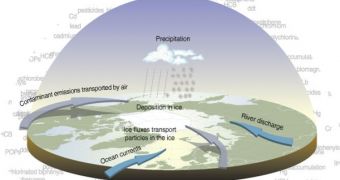The worsening state of the Arctic remains hidden only from those who stubbornly argue that global warming is a fantasy. The latest study published by the United Nations weather agency, the World Meteorological Organization (WMO), says that the ice in the Arctic region recovered a little bit from the low levels it registered last year, but that it also grew thinner, which, in fact, means that the actual volume of ice continues to diminish. Apart from this find, the study also seeks to introduce a new way of looking at climate change patterns, following decades and not individual years.
Although over the past few years there have been variations in temperature all around the North Pole region, with ice melting and recovering in a seemingly balanced fashion, a larger perspective, as gathered from data put together by scientific observations dating back as far as 1979, shows that the overall trend is that of a meltdown, and that seasonal ice growths cannot be an accurate indicator of how the ancient ice sheets are doing.
"What is happening in the Arctic is one of the key indicators of global warming. The overall trend is still upwards," cautions WMO Secretary General Michel Jarraud. He adds that satellite measurements revealed that the size of the ice sheets registered this year is the second lowest in recorded history, and that the next years could see the establishment of new records periodically.
"This decade is almost 0.2 degrees Celsius warmer compared to the previous decade. We have to look at it in that way, comparing decades not years," Britain's Hadley Center climate scientist Peter Stott told Reuters in an interview. Stott is one of the experts who work with WMO, and he supplied a large amount of data to the organization for this study.
"Climate extremes, including devastating floods, severe and persistent droughts, snow storms, heat waves and cold waves were recorded in many parts of the world [due to ice sheet meltdown]," concludes the new report.

 14 DAY TRIAL //
14 DAY TRIAL //